Titian, also known as Tiziano Vecellio, was a leading figure of the Venetian Renaissance. He was a master of vibrant color and innovative styles.
Titian became renowned for his portraits, altarpieces, and mythological scenes. Scholars and art lovers recognize him as one of the most influential artists of the 16th century.
Throughout his illustrious career, Titian worked for various influential patrons, including dukes, kings, and popes.
This international clientele contributed to his widespread fame beyond Venice. His masterpieces, like “Venus of Urbino” and “Bacchus and Ariadne,” showcase his exceptional skill in blending color and form, leaving a lasting impact on the art world.
Titian’s experimentation with various styles marked the transition in art during his lifetime. His ability to adapt and innovate kept him at the forefront of his era’s artistic developments.
Early Life and Training
Titian, born around 1488 to 1490 in Pieve di Cadore, Italy, was a pivotal figure in the Italian Renaissance. His early years in Pieve di Cadore set the foundation for his remarkable career.
His training in Venice was marked by influential encounters with renowned artists, shaping his unique approach to color and composition.
Major Artistic Phases
Titian’s apprenticeship began under the guidance of Giovanni Bellini, a master of Venetian painting. Bellini’s influence is evident in Titian’s rich use of color and ability to create depth.
Later, he collaborated with Giorgione, another key figure of the period, further refining his skills. This partnership led Titian to experiment with more fluid compositions and chiaroscuro techniques, enhancing his reputation as a talented painter.
After Giorgione’s death, Titian independently took on new commissions, developing his distinctive style of combining vibrant colors with dynamic compositions.
His pivotal works during this phase include religious altarpieces and mythological scenes. These projects showcased his ability to integrate traditional themes with innovative artistic expressions.
Influence on Renaissance Art
Titian contributed significantly to the evolution of Renaissance art by integrating his unique techniques into various art forms.
He painted religious altarpieces, portraits, and mythological narratives, each reflecting his mastery of color and realism. His work influenced many artists within the Venetian school and beyond, impacting the artistic community.
His portraiture style, characterized by lifelike depictions and expressive use of light, became a benchmark for future generations.
His influence extended to notable figures, including Philip II of Spain, and helped shape European art trends for centuries.
Titian’s contributions cemented his legacy as a transformative figure in the Renaissance, which heralded an era of artistic innovation and mastery.
Titian’s Most Famous Paintings
Titian was a master of the Renaissance, known for his dynamic compositions and vibrant use of color. His work included portraits, religious themes, and mythological subjects, with each painting revealing his artistic genius.
Venus of Urbino
Titian’s Venus of Urbino, completed in 1538, depicts a reclining nude woman embodying the ideal of feminine beauty during the Renaissance.
The painting is celebrated for its sensuality, masterful use of color, and Venus’s intimate, direct gaze, which engages the viewer.
The composition is meticulously balanced, with the figure set against a rich, detailed interior that includes a maid and a dog, symbolizing fidelity.
This masterpiece is significant for its influence on the portrayal of the female nude in Western art, setting a standard for eroticism and beauty.
Bacchus and Ariadne
Bacchus and Ariadne, painted by Titian between 1522 and 1523, illustrates when Bacchus, the god of wine, discovers Ariadne after Theseus abandons her.
The vibrant and dynamic scene captures the mythological drama with vivid colors and expressive figures.
The painting is renowned for its composition, in which Titian masterfully conveys movement and emotion, particularly in the figure of Bacchus leaping from his chariot.
This work is crucial as it shows Titian’s ability to blend classical mythology with Renaissance humanism, influencing the portrayal of mythological subjects in mythological art.
Equestrian Portrait of Charles V
The Equestrian Portrait of Charles V captures the emperor in a moment of triumph.
Painted in 1548, this masterpiece celebrates Charles V’s victory at the Battle of Mühlberg. The composition showcases Charles V dressed in armor and mounted on a gallant horse.
The serene landscape background contrasts with the power conveyed by the emperor’s presence.
Titian’s use of dramatic light and shadows highlights the glory and power of the ruler, making the painting both a political statement and an artistic achievement.
Today, this work is part of the collection at the Museo del Prado in Madrid, providing insight into the political power dynamics of the time.
Pesaro Madonna
The Pesaro Madonna, completed around 1519-1526, is one of Titian’s most significant religious works.
It was painted for the Pesaro family in Venice’s Santa Maria Gloriosa dei Frari church.
The altarpiece depicts the Virgin Mary with the Christ Child, surrounded by saints and members of the Pesaro family.
The innovative composition uses a diagonal arrangement, guiding the viewer’s eye through the complex interaction of figures.
Titian’s vibrant color palette is a hallmark of his style, adding depth and realism.
The work demonstrates his mastery in balancing religious reverence with personal and family devotion, making it a key piece in Renaissance art.
Sacred and Profane Love
The painting Sacred and Profane Love remains a mystery to many, filled with symbolic elements.
Created in 1514 as a wedding gift, it portrays two women—one dressed splendidly and the other nude—symbolizing the duality of love.
The setting in a lush landscape adds to the serene yet enigmatic atmosphere.
The use of contrasting textures and colors highlights the dual nature of the title.
The work showcases Titian’s ability to weave complex themes into a single canvas.
Now housed in the Galleria Borghese in Rome, it continues to captivate viewers with its intricate portrayal of love’s different forms.
Venus and Adonis
Venus and Adonis is one of Titian’s noteworthy mythological paintings, created around 1554.
It depicts the poignant farewell between the goddess Venus and the mortal Adonis.
The scene is imbued with emotional depth as Venus tries to prevent Adonis from leaving for a hunt.
The rich color palette and careful attention to detail bring the myth to life, capturing the tension and tenderness of the moment.
Titian’s dynamic composition and use of light highlight the drama, drawing viewers into the narrative.
This work resides in several prominent collections, reflecting Titian’s continued admiration for classical themes and his influence on subsequent art movements.
Artistic Style and Techniques
Titian was known for his groundbreaking use of color and light, along with significant innovations in portraiture.
He skillfully combined mythological and religious themes, often adding intricate landscape backgrounds to his compositions. His technique influenced his contemporaries and many future generations of artists.
Use of Color and Light
Titian was renowned for his vibrant use of color, drastically changing how painters approached their palettes.
He experimented with bold color combinations, applying multiple layers to achieve depth and intensity. This technique enhanced the visual richness and allowed him to convey emotion and movement.
His use of light was similarly innovative.
By skillfully contrasting light and shadow, he brought a dramatic focus to his subjects. This strategy heightened the emotional impact of his artworks and presented a new way to address realism in painting.
His understanding of these elements helped establish him as a pioneer of the Venetian school.
Innovations in Portraiture
In portraiture, Titian introduced a new approach that focused on capturing the psychological essence of his subjects.
His portraits often blended realism and idealism, highlighting the character and status of each sitter.
Titian experimented with composition, posing subjects in natural, relaxed positions rather than stiff, formal poses. This technique gave his portraits a sense of intimacy and immediacy.
His ability to convey personality through subtle expressions and body language marked a departure from the more rigid styles of his predecessors, establishing a new standard in portrait artistry.
Mythological and Religious Themes
Titian excelled in integrating mythological and religious themes into his works. He often reimagined these traditional subjects, imbuing them with human emotion and dramatic tension.
His depictions of mythological scenes, such as those in the Rape of Europa, are renowned for their fluidity and expressiveness.
Meanwhile, his religious paintings drew viewers into the spiritual drama through vivid imagery and dynamic compositions.
These thematic choices portrayed divine characters in a relatable manner, allowing viewers to connect deeply with the narratives.
Landscape Backgrounds
Integrating landscape backgrounds in Titian’s many works added a further dimension to his art.
His landscapes were not mere backdrops but active elements that interacted with the figures in the scene. They contributed mood and context, enhancing the piece’s overall storytelling.
He used natural settings to evoke a sense of place and time, connecting the audience with the scene on multiple levels.
Through their masterful use of perspective and atmospheric effects, Titian’s landscapes helped set a standard for future depictions of scenic backgrounds.
By balancing the foreground figures with these environments, he achieved a harmonious composition that enriched the viewer’s experience.
Patronage and Commissioning
Titian, one of the most influential painters of the Renaissance, significantly benefited from the support of patrons across Italy and Europe.
His works attracted local Venetian patrons and powerful royals, who commissioned his art for its emotional depth and innovative style.
Venetian Patrons
Venice was the birthplace of many of Titian’s early commissions.
Wealthy Venetian merchants and nobles played a significant role in his career. They often sought portraits and religious paintings that elevated their status and reflected their piety.
Titian’s style, characterized by vibrant colors and dynamic compositions, appealed to these patrons. His ability to capture the human emotion made his works highly sought after.
For example, Isabella d’Este, an influential figure in Northern Italy, commissioned works from Titian to assert her influence and taste.
Venetian patronage sustained his career and provided a creative environment where he could experiment with new themes and techniques.
Royal Commissions
Titian’s reputation eventually caught the attention of European royalty. He was commissioned by Philip II of Spain, who became one of his most important patrons. This relationship began when Titian met Prince Philip through Philip’s father, Charles V.
The commissions from Philip II marked a significant milestone in Titian’s career. He was tasked with creating a series of paintings known as the ‘poesie,’ or visual poems. These works were highly appreciated for their mythological themes and rich narratives.
Other European royals, including Philip II, sought Titian’s unique artistic touch. These commissions expanded his influence and solidified his status as a leading artist of the Renaissance.
Final Thoughts
Titian, a renowned painter from the Italian Renaissance, made significant contributions to the art world. His use of color and innovative techniques influenced many artists of his time and well into the future.
Key Features of Titian’s Work:
- Vivid Colors: Known for his vibrant color palette, which brought his paintings to life.
- Dynamic Composition: His works often featured dynamic and dramatic scenes.
- Innovative Techniques: Experimented with layering paints to achieve depth and texture.
His impact on the Renaissance period cannot be overstated. Titian’s ability to convey emotion and narrative in his art set a high standard for his contemporaries and future generations of artists.
Titian’s legacy lives on in museums and collections worldwide, continuously inspiring art lovers and scholars. His mastery of paint and form captivates audiences, underscoring his vital role in art history.
Titian remains a pivotal figure in art history, revered for his pioneering spirit and exceptional talent. These key takeaways emphasize his lasting influence and the timeless nature of his work, encouraging ongoing exploration and appreciation.
Frequently Asked Questions
Titian, a renowned figure of the Renaissance, is recognized for his masterful use of color and innovative compositions. His influence extended beyond his time, impacting numerous artists and establishing a legacy in Venetian art.
What is Titian best known for?
Titian is best known for his vibrant use of color and dynamic compositions. Works like Assumption of the Virgin and Venus of Urbino highlight his ability to convey emotion and realism, which set him apart as a leading artist of the Venetian Renaissance.
Why is red hair called Titian?
Red hair is called Titian due to the warm, coppery hues often featured in his paintings. His depiction of hair with rich, reddish tones became so iconic that the term “Titian hair” is now commonly used. The association highlights his influence on color usage.
What kind of person was Titian?
Titian was a dedicated and passionate artist known for his innovative techniques and exploration of human emotion. His ability to blend creativity with technical skills earned him respect among his peers. He was praised for his artistry and professionalism.
When was Titian born and died?
Titian was born around 1488-1490 in Pieve di Cadore, Italy. He passed away in August 1576, leaving a significant body of work. His lifetime spanned the height of the Renaissance, and he became a pivotal figure in art history.
What is a famous quote from Titian?
One notable quote attributed to Titian reflects his commitment to his craft: “Art is what man believes and dreams and wants.” This statement captures his philosophy on the importance of imagination and aspiration in artistic expression. It underscores his deep understanding of art’s power.
Who did Titian inspire?
Titian inspired many later artists, including those involved in the Baroque and Mannerist movements. His influence is evident in the works of artists like Peter Paul Rubens and Diego Velázquez, who admired his use of color and technique. Titian’s legacy continues to impact art education today.
What style of painting is Titian?
Titian is closely associated with the Venetian Renaissance. His work emphasizes natural landscapes, vibrant colors, and realistic human figures. It is known for its emotional depth and sophisticated use of light and shadow.
What are some fun facts about Titian?
Titian was highly successful during his lifetime, receiving commissions from powerful patrons, including emperors and popes. He lived in Venice for most of his life and was deeply influenced by its rich culture. His long career allowed him to evolve his artistic style continuously.
What Colours did Titian use?
Titian was renowned for using rich, deep colors, especially reds, blues, and gold. He employed these colors to create dramatic contrasts and emphasize some of his compositions. His approach to color mixing and layering was innovative and influential.
How did the styles of Titian and Giorgione differ?
Titian and Giorgione differed in their approach to composition and subject matter.
While both painters were part of the Venetian Renaissance, Giorgione often focused on mood and atmosphere with less emphasis on narrative.
Meanwhile, Titian developed a more dynamic use of color and detail in storytelling.
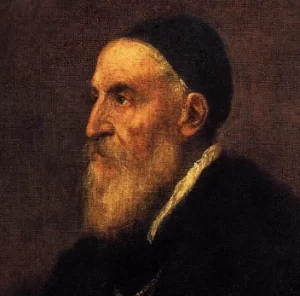
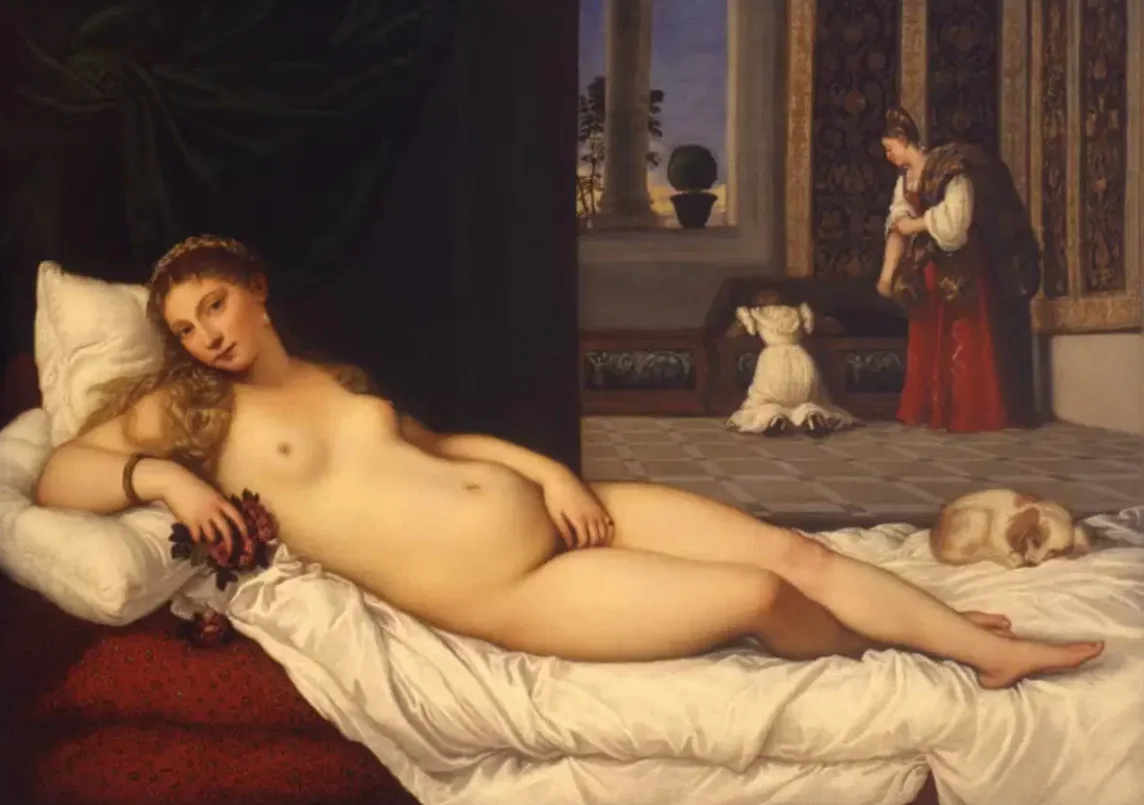
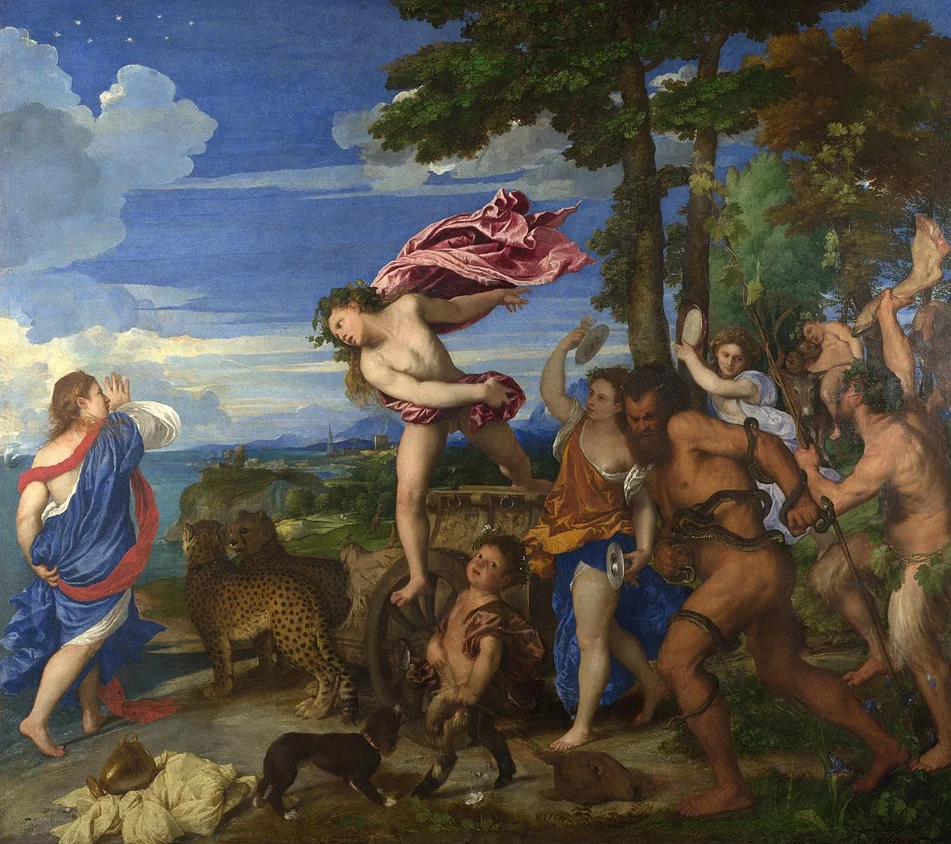
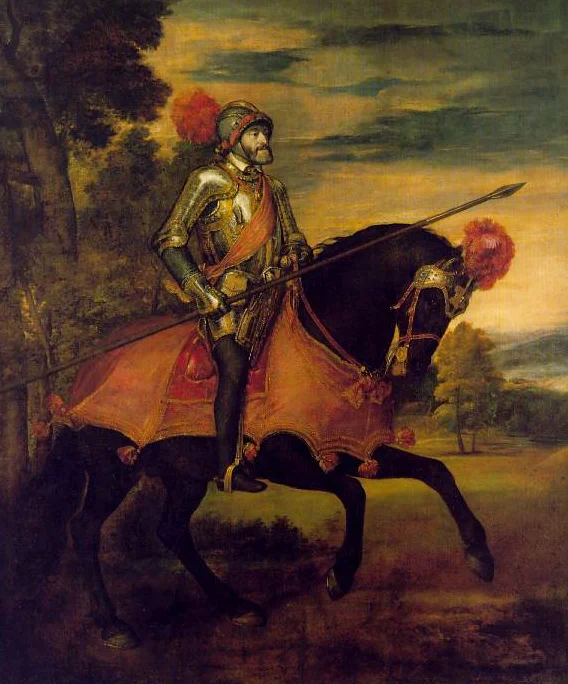
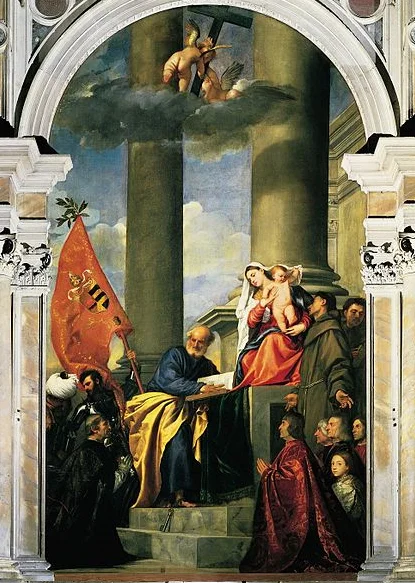
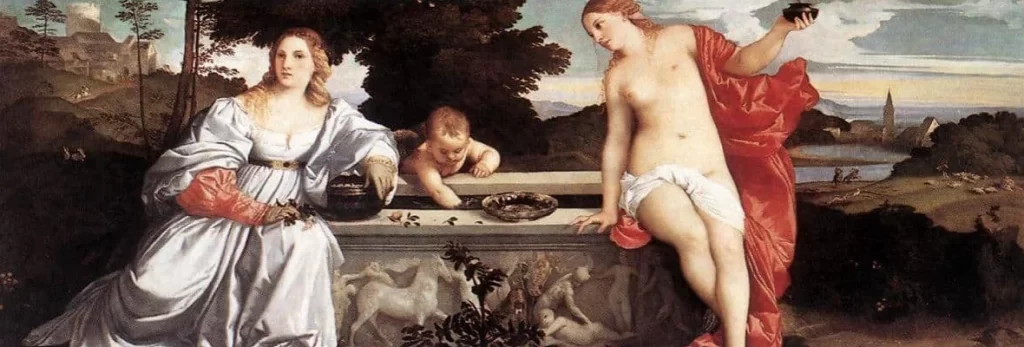
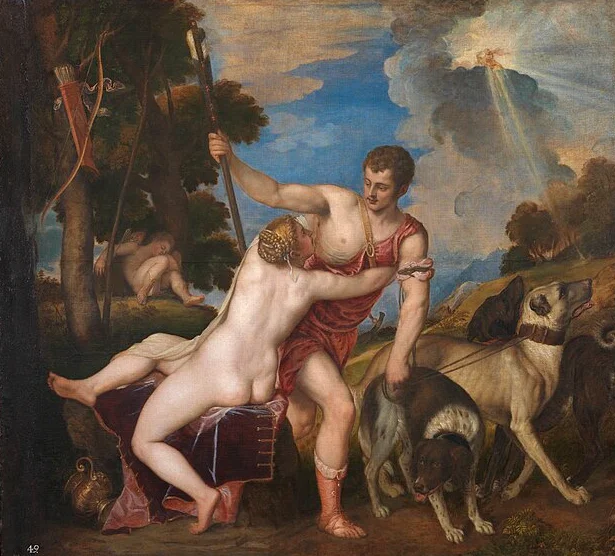

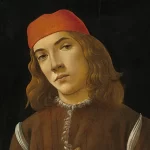

 Leonardo Bianchi,
the creator of Leonardo da Vinci's Inventions.
Thank you for visiting
Leonardo Bianchi,
the creator of Leonardo da Vinci's Inventions.
Thank you for visiting